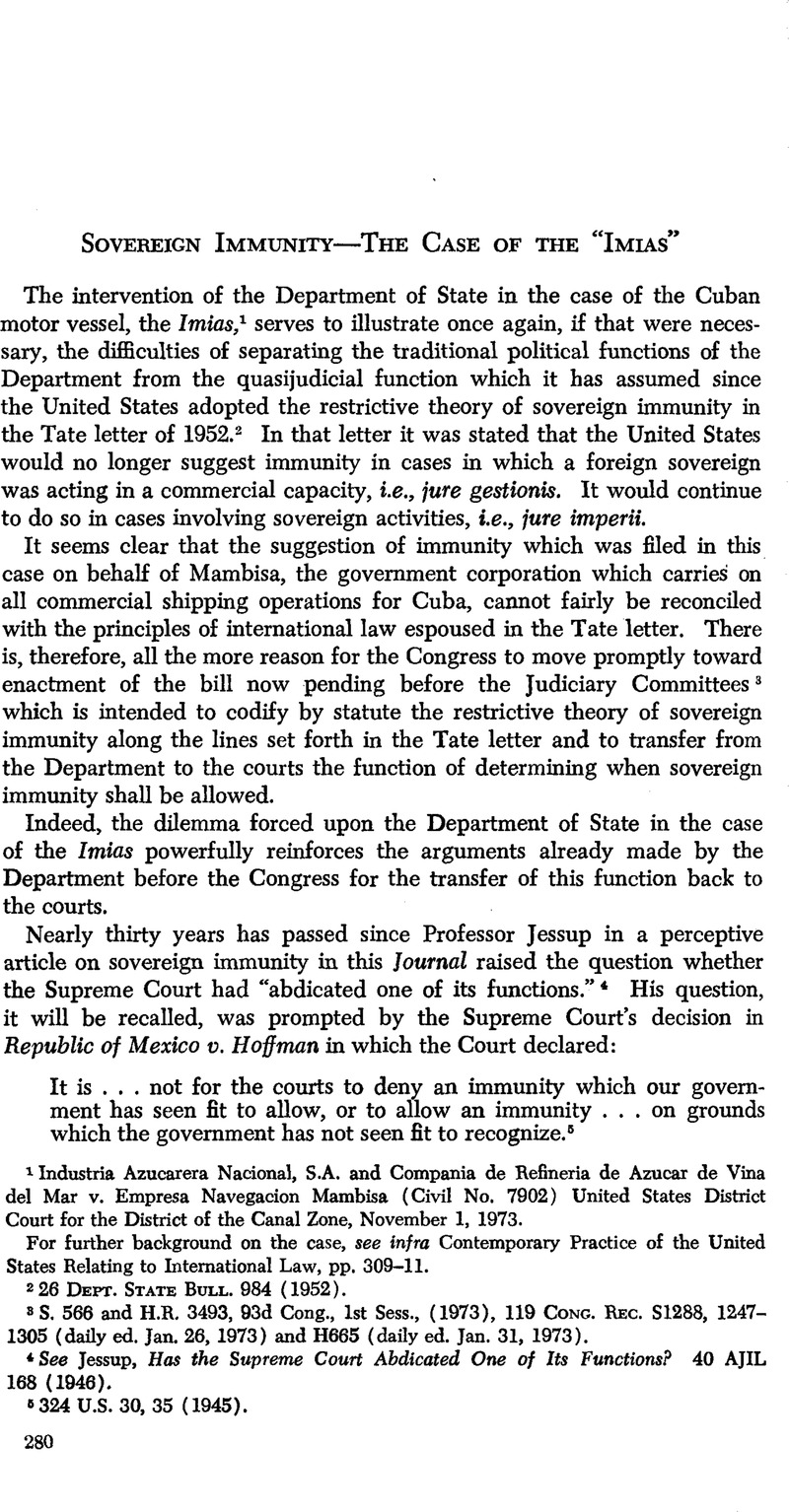Published online by Cambridge University Press: 28 March 2017

1 Industria Azucarera Nacional, S.A. and Compania de Refineria de Azucar de Vina del Mar v. Empresa Navegacion Mambisa (Civil No. 7902) United States District Court for the District of the Canal Zone, November 1, 1973.
For further background on the case, see infra Contemporary Practice of the United States Relating to International Law, pp. 309–11.
2 26 Dept. State Bull. 984 (1952).
3 S. 566 and H.R. 3493, 93d Cong., 1st Sess., (1973), 119 Cong. Rec. S1288, 1247–1305 (daily ed. Jan. 26, 1973) and H665 (daily ed. Jan. 31, 1973).
4 See Jessup, , Has the Supreme Court Abdicated One of Its Functions? 40 AJI 168 (1946)Google Scholar.
5 324 U.S. 30, 35 (1945).
6 295 F.2d 24 (4th Cir. 1961).
7 420 Pa. 134, 215 A.2d 864 (1966).
8 336 F.2d 354 (2nd Cir. 1964), cert, denied, 381 U.S. 934 (1965).
9 80 Stat. 381, 5 U.S.C. §551.
10 27 Stat. 445, 46 U.S.C. §190.
11 Section 1605 of the bill.
12 318 U.S. 578 (1943).
13 Compania Espanola de Navegacion Maritima S.A. v. The Navemar, 303 U.S. 68 (1938).
14 11 U.S. (7 Cranch) 116 (1812).
15 295 F.2d 24 (4th Cir. 1961).
16 The writ of mandamus, which is dated November 13, 1973, cites the same cases as those cited by the government in the suggestion of immunity and promises that a full opinion will be forthcoming. At the time this comment was prepared, the full opinion of the Fifth Circuit had not appeared. One of the issues briefed and argued by counsel for the Chilean plaintiffs in its memorandum in opposition to the writ of mandamus was the issue of administrative due process. To what extent was the State Department free to disregard the policy laid down in the Tate letter? To what extent was the State Department free to issue the suggestion of immunity without making public the factual basis and the reasons for its findings?
On February 13, 1974 Judge Wisdom handed down the opinion of the Court, holding “that the executive’s decision to recognize and allow a claim of foreign sovereign immunity binds the judiciary, and that no further review of the executive’s action is dictated by the Administrative Procedures Act.” Spacil v. Crowe, No. 73–3599 (5th Cir., filed Feb. 13, 1974).
Unfortunately, the important issue of administrative due process cannot be discussed in this note because of limitations of space.
17 For purposes of this note it is assumed, as does the Tate letter, that sovereign immunity is a matter for decision under international law. This note does not consider alternative formulations such as the position that sovereign immunity is merely a question of comity. Nor does it consider whether the resolution of this controversy should depend on the special status of the Panama Canal in international law.
18 Supra note 2.
19 Supra note 3.
20 119 Cong. Rec. S1304 (daily ed., Jan. 26, 1973).
21 The Belgenhnd, 114 U.S. 355 (1885) (Opinion per Bradley).
22 Canada Malting Co. v. Paterson Steamships, 285 U.S. 413 (1932) (Opinion per Brandeis).
23 Swift & Company Packers v. Compania Colombiana Del Caribe, 339 U.S. 684 (1950) (Opinion per Frankfurter).
24 Panama may have contributed to the same result. It delivered a note to the United States protesting the attachment of the Imias. In the past the Republic of Panama has claimed that the Panama Canal does not constitute part of the territory of the United States but rather is an “international public utility” maintained and protected by the United States. Statement of the Representative of the Republic of Panama to the United Nations, 19 UN SCOR, 1086th Meeting 4–14 (Jan. 10, 1964); cf. Convention between the United States and Panama, Art. iii, 33 Stat. 2234, T.S. No. 431.
25 197 F.Supp. 710 (E.D. Va. 1961), 295 F.2d 24 (4th Cir. 1961); application for stay was denied by the Supreme Court.
26 TIAS 7579, 67 AJIL 619 (1973); 12 ILM 370 (1973).